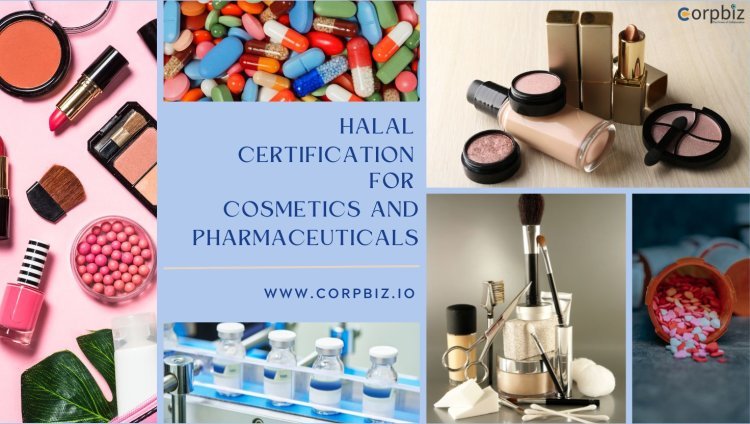Why Halal Certification Matters for Cosmetics and Pharmaceuticals?
Discover why halal certification is essential for cosmetics and pharmaceuticals. Learn its benefits, process, and impact on ethical branding and global markets.

In today’s globalized world, businesses are no longer confined to geographical boundaries. For entrepreneurs and startups in the cosmetics and pharmaceutical sectors, understanding the growing demand for halal-certified products can open doors to new markets. But why does halal certification matter, and how can it impact your business? Let’s dive into the importance of halal certification and why it’s a game-changer for modern enterprises.
Halal certification is not limited to halal meat certificates or halal food certification; it also applies to non-edible products like cosmetics and pharmaceuticals. With rising consumer awareness and ethical preferences, halal product certification has become a benchmark for quality, purity, and trust.
Understanding Halal Certification
The term "halal" originates from Arabic, meaning "permissible" or "lawful." In the context of certification, halal means that a product adheres to Islamic dietary laws and guidelines. While halal food certification is well-known, Halal Certification also extends to cosmetics and pharmaceuticals, ensuring these products are free from haram (prohibited) ingredients and meet specific manufacturing standards.
Halal product certification evaluates the ingredients, production processes, and overall supply chain to ensure compliance with Islamic principles. For example, the use of alcohol, porcine-derived substances, or non-halal animal derivatives is strictly prohibited in halal-certified cosmetics and pharmaceuticals.
Why Halal Certification Matters for Cosmetics
The cosmetics industry has witnessed a significant shift towards ethical and sustainable products. Halal certification plays a crucial role in this transformation by ensuring that products meet stringent ethical standards. Here’s why halal certification is essential for cosmetics:
-
Expanding Consumer Base
With a growing Muslim population globally, there is an increasing demand for halal-certified cosmetics. Offering halal-certified products can help your brand cater to this vast market segment.
-
Building Trust and Credibility
Halal certification reassures consumers about the purity and ethical nature of your products, enhancing your brand’s reputation.
-
Compliance with Global Standards
Many countries with significant Muslim populations, such as Indonesia and Malaysia, require halal certification for imported cosmetics. Securing a halal license ensures compliance with these regulations, enabling smooth market entry.
Why Halal Certification Matters for Pharmaceuticals
The pharmaceutical industry has its own set of challenges, with consumers demanding transparency and safety in medicines and supplements. Halal certification addresses these concerns and provides the following benefits:
-
Meeting Ethical Standards
Halal-certified pharmaceuticals are free from prohibited ingredients, making them a preferred choice for ethically conscious consumers.
-
Global Market Access
Similar to cosmetics, halal certification for pharmaceuticals opens opportunities in Muslim-majority countries, where halal compliance is mandatory.
-
Enhanced Consumer Trust
With halal certification, consumers can trust that the medicines or supplements they consume are manufactured with utmost care and meet Islamic guidelines.
The Business Impact of Halal Certification
Securing halal certification is not just about meeting religious requirements; it’s a strategic business decision. Let’s explore how halal certification impacts entrepreneurs and startups:
-
Unlocking New Markets
Halal certification allows businesses to tap into the lucrative global halal market, which is estimated to be worth trillions of dollars annually.
-
Standing Out in a Competitive Market
In industries flooded with options, halal product certification sets your brand apart, showcasing your commitment to quality and ethical practices.
-
Improving Brand Image
Consumers are more likely to trust brands that align with their values. Halal certification reflects your brand’s dedication to inclusivity and transparency.
Also Read: India Sets New Guidelines for Halal Meat Exports
The Certification Process
Obtaining a halal license involves a detailed process to ensure your products meet all requirements. Here’s an overview:
-
Ingredient Verification
Every ingredient in your product must be examined to confirm it is halal-compliant.
-
Production Process Inspection
The manufacturing process is reviewed to ensure there is no cross-contamination with non-halal substances.
-
Halal Certification Body Approval
Accredited certification bodies, recognized under Indian guidelines, issue the halal license after thorough evaluation.
Halal Certification in India
In India, the halal certification process follows strict guidelines to cater to both domestic and international markets. Entrepreneurs and startups can approach recognized certification bodies to obtain a halal license for their products.
While halal food certification and halal meat certificates are common, halal certification for cosmetics and pharmaceuticals is gaining momentum. Indian manufacturers and exporters can benefit significantly by ensuring their products meet these standards, as they align with international market demands.
Key Takeaways for Entrepreneurs and Startups
-
Priorities Compliance
Ensure your products meet halal requirements to avoid rejection in global markets.
-
Invest in Certification
The cost of halal certification is an investment in expanding your business opportunities.
-
Market Your Certification
Once you have a halal license, use it as a unique selling point to attract ethically conscious consumers.
FAQs
- What is halal certification, and why is it important for cosmetics and pharmaceuticals?
Halal certification ensures that products comply with Islamic guidelines, verifying they are free from prohibited ingredients. It is important as it helps brands meet ethical standards, gain consumer trust, and access global markets.
- How can startups apply for halal certification in India?
Startups can approach recognized halal certification bodies in India. The process involves verifying ingredients, inspecting the manufacturing process, and obtaining approval from the certification body.
- Is halal certification necessary for non-food products?
Yes, halal certification is essential for non-food products like cosmetics and pharmaceuticals to cater to the growing demand for ethical and compliant products globally.
By securing halal certification for your cosmetics or pharmaceutical business, you’re not just meeting market demands; you’re building a brand that stands for trust, quality, and inclusivity. Let us embrace this opportunity to contribute to a growing global movement and expand our entrepreneurial horizons.
Source URL: https://blogool.com/article/why-halal-certification-matters-for-cosmetics-and-pharmaceuticals
What's Your Reaction?













